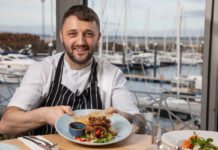Seasonal businesses fear they will ‘miss the boat’ for summer bookings

CLARITY on timelines for the reopening of all types of hospitality businesses and social distancing protocols, including a scientific review of the case for two-metre distancing, are the key demands from Highland operators in a fresh plea to the Scottish Government.
Hospitality business owners from across the north Highlands, North Coast 500 route, Argyll and the Isle of Skye have again written to first minister Nicola Sturgeon calling for urgent action to help reopen businesses this summer, saying they fear they will “miss the boat” for bookings this year.
The group of 75 operators, which is headed up by David Whiteford of the North Highland Initiative and Tanja Lister of the Kylesku Hotel in Sutherland, say the difference between reopening in July or September could be the determining factor in the survival of hospitality businesses and their suppliers.
“The cabinet secretary for rural economy and tourism has indicated that a further announcement will take place on June 10; we would ask this date be brought forward, or at the very least that the Scottish Government indicates its plans to reopen for tourism this summer,” said the group in the letter.
“If our businesses cannot open until the autumn then, given the short season, it will be less viable for those that are seasonal to reopen until next year, meaning many will have been shut for 18 months.
“With almost all other European countries having now published clear timelines for the reopening of their hotels and restaurants, and with England expected to follow suit soon, our ongoing message that ‘Scotland is closed’ risks bookings for the summer being transferred elsewhere. There would be little point in reopening our businesses over the summer if we have missed the boat.
“It is a fact that restaurants and hotels are rapidly reopening across Europe; the main tourism season, starting on June 15 as borders reopen, is being actively championed and fought for by the respective leaders of these countries. Whilst they are actively encouraging visitors, our silence is deafening.”
The group has also called for the publication of social distancing protocols required for reopening, including a scientific review of the case for two-metre distancing, saying it is “imperative that we actively evaluate progress that is made in other European countries that have already reopened their tourism industries, many of whom have elected to go for one-metre social distancing”. Trade groups have issued repeated calls for the social distancing rule to be cut from two metres, saying it will not be commercially viable or practical for bars and restaurants to operate.
In the letter, the operators say that while “absolute priority must be given to ensuring the safety of our teams, guests and communities… we must also ensure that the distancing measures we adopt are backed by scientific evidence and ongoing evaluation of progress made in other countries”.
“We are amongst a very small minority of countries across the EU using two metres, with most opting for either 1m or 1.5m; indeed, the WHO (World Health Organisation) itself recommends a minimum of only 1m,” said the group in the letter.
“We need to be clear that this extra caution is warranted. In the case of the Kylesku Hotel alone, adopting a two-metre distance in between tables reduces our capacity by over 60%. Equally, many restaurant kitchens operate with space limitations and it is clear that the need for these enhanced measures will be a determining factor in whether many of our businesses will be able to reopen profitably.
“It will take time to ensure our venues are adapted to suit new regulations, equipment (much of it already in short supply) will need to be ordered, staffing levels will need to be reviewed and time for training factored in. The more time we have to plan, the more we can ensure a readiness to reopen safely.
“As mentioned in our previous letter, we all recognise that these dates would be dependent upon progress against the virus, but having a tentative date is better than none at all.”

























